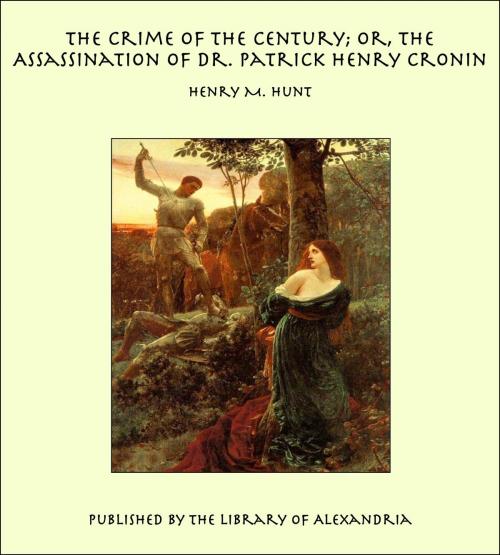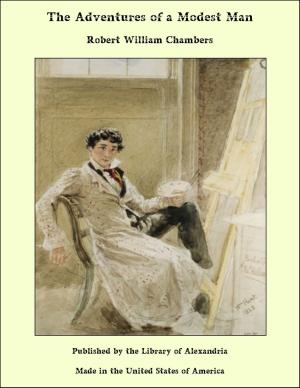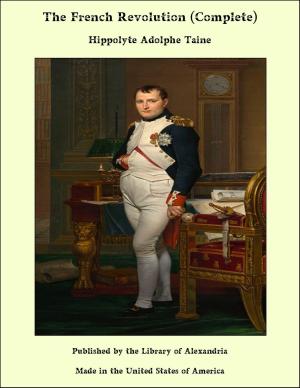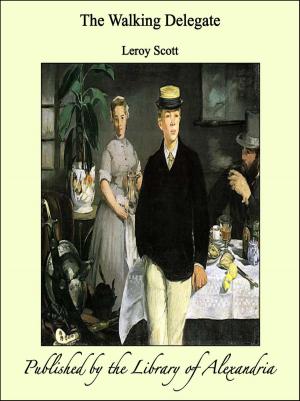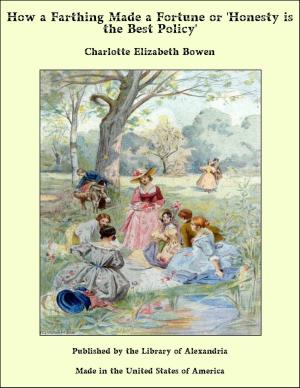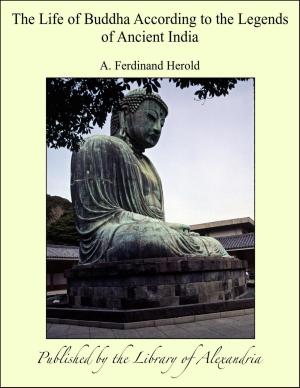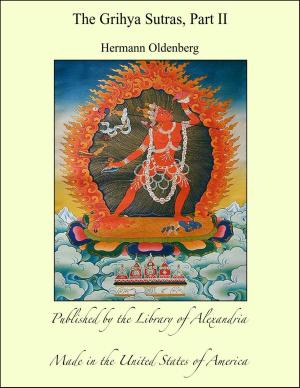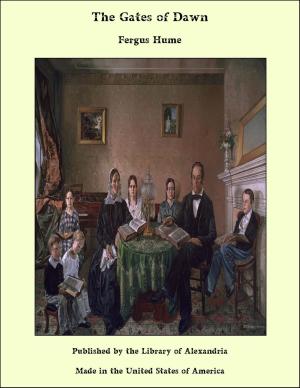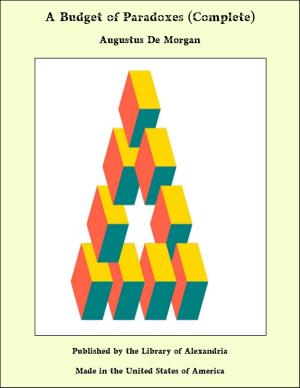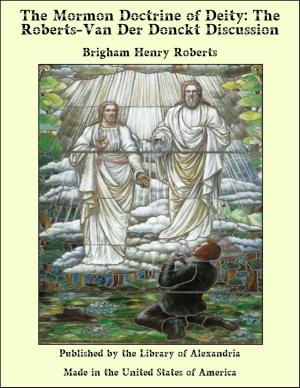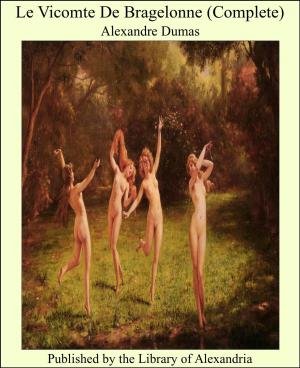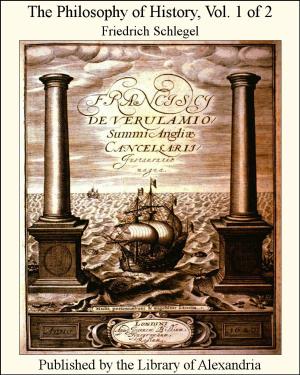The Crime of the Century; or, The Assassination of Dr. Patrick Henry Cronin
Nonfiction, Religion & Spirituality, New Age, History, Fiction & Literature| Author: | Henry M. Hunt | ISBN: | 9781465547446 |
| Publisher: | Library of Alexandria | Publication: | March 8, 2015 |
| Imprint: | Language: | English |
| Author: | Henry M. Hunt |
| ISBN: | 9781465547446 |
| Publisher: | Library of Alexandria |
| Publication: | March 8, 2015 |
| Imprint: | |
| Language: | English |
A CRIME THAT SHOCKED THE CIVILIZED WORLD—THE MYSTERIOUS STRANGER—A SUDDEN SUMMONS—THE INSTINCTS OF HUMANITY TRIUMPH OVER PERSONAL CONSIDERATIONS—LAST MOMENTS AT HOME—PARTING WORDS WITH A FRIEND—DR. CRONIN'S EVENTFUL LIFE—HOW HE WORKED HIS WAY UPWARD ON THE LADDER OF HONOR AND FAME. Little introduction to this volume is needed. It is the story—told in plain unvarnished words, so that everyone who reads may understand—of a crime that has shocked the people of the United States, and astounded the civilized world. Back of that crime was a conspiracy so wide in its ramifications, so cunningly contrived, so successfully executed, as to rival the diabolical plots and outgrowing tragedies that have been placed at the doors of the secret societies of France, Italy and Spain, by the historians of the Dark Ages. In the United States, as an event of national importance, the crime may be said to rank with the assassinations of Presidents Lincoln and Garfield. In the case of the former, as of the latter, the perpetrator of the crime was a half crazed enthusiast, who imagined that he had a mission to perform in taking the life of the Chief Magistrate of the Republic. An effort was made, it is true, to demonstrate the fact that the assassin of Abraham Lincoln was but the tool of a band of conspirators, but, despite the fact that five of his alleged accomplices suffered an ignominious death upon the scaffold upon conviction for complicity in the appalling crime, the question as to the actual existence of a conspiracy has remained to this day a mooted one. In the case of President Garfield there was not even a suggestion that the assassin acted upon other than his own insane impulse. So far as concerns the Haymarket horror in Chicago, the point as to whether the throwing of the bomb that echoed around the world was the outcome of a conspiracy, or the act of an individual who had inbibed anarchistic principles and doctrines until reason had been dethroned, and a desire for vengeance upon the supposed enemies of the proletaire had generated into an uncontrollable determination, is still unsettled in the minds of many people eminently well versed in the law; as well as in those of a goodly proportion of the masses. So far, however, as the tragic fate of Dr Cronin is concerned, no such doubt may be said to exist. That he fell a victim to a plot, remarkable in its conception and execution; conceived in shrewdness and forethought, and executed by the aid of far-reaching and elaborate machinery; and with remorseless precision, is beyond peradventure. But it serves no purpose to anticipate. The following chapters tell their own story of the manner and methods by which the murder of a law-abiding American citizen, prominent in his profession and of national reputation, was decreed and carried out. It was the first crime of its character in the history of the United States. It will probably be the last. THE DISAPPEARANCE. The locality was Chicago. The date Saturday, May 4th, in the year of our Lord one thousand eight hundred and eighty-nine. The time eight o'clock of the evening. Philip Patrick Henry Cronin—for this was the full name of the physician—was closeted with a patient in the most spacious of the front suite of rooms attached to a handsomely furnished flat directly over the Windsor Theatre on North Clark Street. The tenants of the flat, T. T. Conklin, a well-known saloon keeper, and his wife, were among his most intimate and confidential friends, and with them the physician, who was a confirmed bachelor, had resided so long that he was regarded, to all intents and purposes, as one of the family. They nursed him in sickness, studied his every requirement when in health, and in a great measure, shared with him his personal and political knowledge. It was a happy, congenial family in every sense of the term. Dr. Cronin was on the point of dismissing the patient, for an important meeting of the Celto-American Society, which published a paper of which he was the political editor, necessitated his hurrying away to the other side of the city, when the door-bell rang violently. Mrs. Conklin responded. A man pale and breathless, stood on the landing
A CRIME THAT SHOCKED THE CIVILIZED WORLD—THE MYSTERIOUS STRANGER—A SUDDEN SUMMONS—THE INSTINCTS OF HUMANITY TRIUMPH OVER PERSONAL CONSIDERATIONS—LAST MOMENTS AT HOME—PARTING WORDS WITH A FRIEND—DR. CRONIN'S EVENTFUL LIFE—HOW HE WORKED HIS WAY UPWARD ON THE LADDER OF HONOR AND FAME. Little introduction to this volume is needed. It is the story—told in plain unvarnished words, so that everyone who reads may understand—of a crime that has shocked the people of the United States, and astounded the civilized world. Back of that crime was a conspiracy so wide in its ramifications, so cunningly contrived, so successfully executed, as to rival the diabolical plots and outgrowing tragedies that have been placed at the doors of the secret societies of France, Italy and Spain, by the historians of the Dark Ages. In the United States, as an event of national importance, the crime may be said to rank with the assassinations of Presidents Lincoln and Garfield. In the case of the former, as of the latter, the perpetrator of the crime was a half crazed enthusiast, who imagined that he had a mission to perform in taking the life of the Chief Magistrate of the Republic. An effort was made, it is true, to demonstrate the fact that the assassin of Abraham Lincoln was but the tool of a band of conspirators, but, despite the fact that five of his alleged accomplices suffered an ignominious death upon the scaffold upon conviction for complicity in the appalling crime, the question as to the actual existence of a conspiracy has remained to this day a mooted one. In the case of President Garfield there was not even a suggestion that the assassin acted upon other than his own insane impulse. So far as concerns the Haymarket horror in Chicago, the point as to whether the throwing of the bomb that echoed around the world was the outcome of a conspiracy, or the act of an individual who had inbibed anarchistic principles and doctrines until reason had been dethroned, and a desire for vengeance upon the supposed enemies of the proletaire had generated into an uncontrollable determination, is still unsettled in the minds of many people eminently well versed in the law; as well as in those of a goodly proportion of the masses. So far, however, as the tragic fate of Dr Cronin is concerned, no such doubt may be said to exist. That he fell a victim to a plot, remarkable in its conception and execution; conceived in shrewdness and forethought, and executed by the aid of far-reaching and elaborate machinery; and with remorseless precision, is beyond peradventure. But it serves no purpose to anticipate. The following chapters tell their own story of the manner and methods by which the murder of a law-abiding American citizen, prominent in his profession and of national reputation, was decreed and carried out. It was the first crime of its character in the history of the United States. It will probably be the last. THE DISAPPEARANCE. The locality was Chicago. The date Saturday, May 4th, in the year of our Lord one thousand eight hundred and eighty-nine. The time eight o'clock of the evening. Philip Patrick Henry Cronin—for this was the full name of the physician—was closeted with a patient in the most spacious of the front suite of rooms attached to a handsomely furnished flat directly over the Windsor Theatre on North Clark Street. The tenants of the flat, T. T. Conklin, a well-known saloon keeper, and his wife, were among his most intimate and confidential friends, and with them the physician, who was a confirmed bachelor, had resided so long that he was regarded, to all intents and purposes, as one of the family. They nursed him in sickness, studied his every requirement when in health, and in a great measure, shared with him his personal and political knowledge. It was a happy, congenial family in every sense of the term. Dr. Cronin was on the point of dismissing the patient, for an important meeting of the Celto-American Society, which published a paper of which he was the political editor, necessitated his hurrying away to the other side of the city, when the door-bell rang violently. Mrs. Conklin responded. A man pale and breathless, stood on the landing
